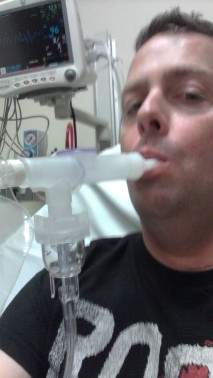 I am back in the hospital only three weeks after my trachea resection. Things were going fine until two days ago when I noticed stridor sounds and increased coughing. Uh oh…was my first thought. This thing is re-stenosing and I was going to have to get another dilation or worse yet, a re-resection.
I am back in the hospital only three weeks after my trachea resection. Things were going fine until two days ago when I noticed stridor sounds and increased coughing. Uh oh…was my first thought. This thing is re-stenosing and I was going to have to get another dilation or worse yet, a re-resection.

So here I am in the ICU at Emory University Hospital Midtown and am being administered strong IV steroids and breathing treatments. They say I may have a shot of getting discharged tomorrow depending on how it looks when they scope me in the morning.
UPDATE *** I have a 50% narrowing of my trachea already…the resection failed. I am being admitted to the ICU and they’ve scheduled a dialiton for the morning.
I am actually more scared now than I was before I had the big tracheal resection surgery three weeks ago. Those doctors at Emory University Otolaryngology assured me a 98% success rate and said patients rarely exhibit re-stenosis.
I followed all my aftercare instructions so I don’t know why this is happening to me. If anyone has any experience like this, please comment. Thanks.
